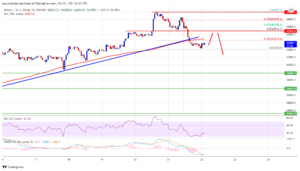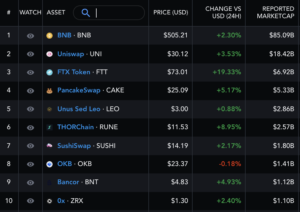
Centralized Finance (CeFi) is the fundamental model of the traditional financial ecosystem, which comprises stakeholders such as monetary oversight bodies, regulators and financial institutions. As such, all these stakeholders work in collaboration towards sustaining sound financial markets.
Despite its value proposition in traditional finance, the CeFi model has come under constant criticism due to its centralized nature. One of the shortcomings of this model is reliance on human power to make decisions for a larger population. For instance, the U.S federal reserve can decide to lower or hike interest rates without much public consultation. While it may be in the public’s best interest, some decisions made by monetary authorities are largely unpopular.
Furthermore, central authorities are notorious for using their control over systems to stamp out rivals or threats. This can be seen in the crypto industry, where authoritarian governments have an easier time cracking down on market operations or passing laws that limit innovation. In most cases, the authorities claim to be acting in the consumers’ interest, which might be true, but some simply protect their control over market operations.
The Risk of Third Parties in Financial Ecosystems
Moving away from the oversight bodies, we have financial institutions that provide services such as loans, insurance and fund investing. These financial vehicles act as third parties by enabling consumers to access market services. In doing so, they bridge the gap of financial inclusion, although not completely.
While third parties pose significant risks to the existing market systems, the risk is even more significant in nascent ecosystems like the crypto industry. For example, prominent crypto exchanges such as Binance and Coinbase have had to halt transactions in recent months as their systems were overloaded. During these times, crypto investors and traders had to OrionProtocol which allows users to view offers across various exchanges. This DeFi protocol simplifies trading by integrating an all-in-one ecosystem where crypto investors and traders can execute their orders.
In addition, the OrionProtocol allows anyone to start buying crypto-assets like Bitcoin and Ether without providing any KYC documents. Instead, users only need a wallet address, and in a few clicks, they can purchase the crypto of their choice.
Closing Thoughts
The traditional financial market infrastructure remains a fundamental pillar of today’s market and future innovations such as DeFi. However, a few improvements or changes need to be made to be compatible with the digital ecosystem era. This will require the collaboration of stakeholders, including crypto innovators, regulators and prospective consumers. So far, some progress has been made, but it may take time before decentralized markets are fully adopted across the globe.
- 2020
- access
- All
- applications
- architecture
- Assets
- bearish
- BEST
- binance
- Bitcoin
- blockchain
- Borrowing
- BRIDGE
- Buying
- cases
- coinbase
- collaboration
- Consumers
- contracts
- countries
- crypto
- Crypto Exchanges
- Crypto Industry
- crypto-assets
- decentralized
- Decentralized Finance
- DeFi
- Derivatives
- digital
- documents
- ecosystem
- Ecosystems
- Ether
- Exchanges
- farming
- Federal
- federal reserve
- finance
- financial
- financial inclusion
- Financial institutions
- financial services
- follow
- fund
- future
- gap
- Giving
- governance
- Governments
- Growth
- HTTPS
- Including
- inclusion
- industry
- Infrastructure
- Innovation
- innovators
- institutions
- insurance
- interest
- Interest Rates
- investing
- investment
- investor
- Investors
- involved
- IT
- KYC
- Laws
- lending
- Loans
- Market
- Markets
- model
- months
- networks
- offer
- Offers
- Operations
- orders
- Pillar
- platform
- Platforms
- Popular
- population
- power
- Profit
- Programs
- projects
- protect
- public
- purchase
- Rates
- regulations
- Regulators
- reliance
- Risk
- sell
- Services
- set
- smart
- Smart Contracts
- So
- Space
- start
- surprise
- Systems
- third parties
- threats
- time
- Tokens
- trade
- Traders
- Trading
- traditional finance
- Transactions
- users
- value
- Vehicles
- View
- Wallet
- Work
- Yield












